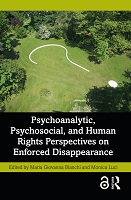Chapter 10 Tortured and disappeared bodies
Proposal review
The problem of ‘knowing’
| dc.contributor.author | Luci, Monica | |
| dc.date.accessioned | 2023-12-06T13:21:42Z | |
| dc.date.available | 2023-12-06T13:21:42Z | |
| dc.date.issued | 2024 | |
| dc.identifier.uri | https://library.oapen.org/handle/20.500.12657/85788 | |
| dc.description.abstract | The author pursues the hypothesis that tortured bodies are the sites of ‘knowing’ for torturous societies, the ‘places’ into which unprocessed social contents are stored and interrogated through torture by the ruling group and/or made disappear through enforced disappearances. The combination of crimes such as torture and enforced disappearance perpetrated by states represents an extreme social case that illustrates the processes leading to the social dynamics of massive denial (‘knowing and not knowing’) of what is happening in a society slipped into a monolithic societal state for perpetrators, bystanders and victims. The concept of embeddedness expresses the notion that social actors exist within relational, institutional, and cultural contexts and cannot be seen as atomized decision-makers. The body of the victim of torture and enforced disappearance seems to be the site where, in case of severe social violence, the ‘truth’ is stored and can be regained, together with the possibility of collective healing that repairs social ties, be it a body that survived torture, or one that succumbed, like in the case of many disappeared. Psychotherapy with torture survivors and the collective process of restoring the historical truth in societies that lived enforced disappearances seem to point in this direction. | en_US |
| dc.language | English | en_US |
| dc.subject.classification | bic Book Industry Communication::J Society & social sciences::JP Politics & government::JPV Political control & freedoms::JPVH Human rights | en_US |
| dc.subject.classification | bic Book Industry Communication::J Society & social sciences::JM Psychology | en_US |
| dc.subject.classification | bic Book Industry Communication::J Society & social sciences::JM Psychology::JMA Psychological theory & schools of thought::JMAF Psychoanalytical theory (Freudian psychology) | en_US |
| dc.subject.other | Disappearance, Luci, Torture, Enforced, Bianchi, Human, Psychoanalysis | en_US |
| dc.title | Chapter 10 Tortured and disappeared bodies | en_US |
| dc.title.alternative | The problem of ‘knowing’ | en_US |
| dc.type | chapter | |
| oapen.identifier.doi | 10.4324/9781003312642-14 | en_US |
| oapen.relation.isPublishedBy | 7b3c7b10-5b1e-40b3-860e-c6dd5197f0bb | en_US |
| oapen.relation.isPartOfBook | b7a24a75-2d3f-4f2a-86f0-1edc3e04e1b4 | en_US |
| oapen.relation.isFundedBy | ca077e3f-1580-4778-b4ea-a7b92f991f35 | en_US |
| oapen.relation.isbn | 9781032320588 | en_US |
| oapen.relation.isbn | 9781032320571 | en_US |
| oapen.imprint | Routledge | en_US |
| oapen.pages | 18 | en_US |
| peerreview.anonymity | Single-anonymised | |
| peerreview.id | bc80075c-96cc-4740-a9f3-a234bc2598f1 | |
| peerreview.open.review | No | |
| peerreview.publish.responsibility | Publisher | |
| peerreview.review.stage | Pre-publication | |
| peerreview.review.type | Proposal | |
| peerreview.reviewer.type | Internal editor | |
| peerreview.reviewer.type | External peer reviewer | |
| peerreview.title | Proposal review |

